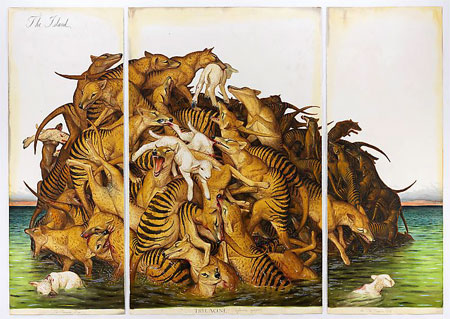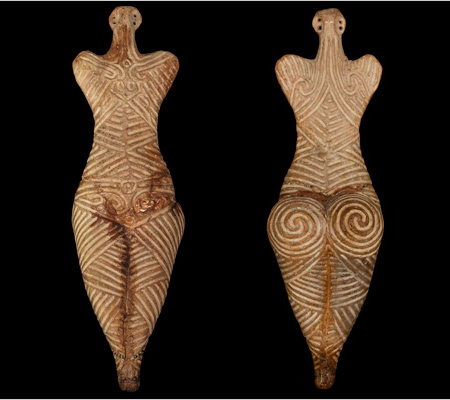(Walton Ford, The Island, Paul Kasmin Gallery.)
Monthly Archives: December 2009
december 2–december 5
Books
- Aldo Buzzi, The Perfect Egg, and Other Secrets (trans. Guido Waldman)
- Henry Green, Pack My Bag: A Self-Portrait
Films
- Zazie dans le métro, directed by Louis Malle
- ¿Qué he hecho yo para merecer esto!! (What Have I Done to Deserve This?), dir. Pedro Almodóvar
- Kika, dir. Pedro Almodóvar
- Nosotros, los pobres, dir. Ismael Rodríguez
- The Invisible Man, dir. James Whale
- Up in the Air, dir. Jason Reitman
Exhibits
- “Walton Ford: New Work,” Paul Kasmin Gallery
- “Kaz Oshiro: Setting Sun,” Yvon Lambert
- “Robert Ryman,” Yvon Lambert
- “Drawn Together: Chiharu Shiota/GEGO,” Goff + Rosenthal
- “Perlstein/Held: Five Decades,” Betty Cunningham Gallery
- “Dan Fischer: Unique Forms of Continuity in Space,” Derek Eller Gallery
- “Paul Chan: Sade for Sade’s Sake,” Greene Naftali
- “Wallace Berman: 1927–1976,” Nicole Klagsbrun
- “Lynda Benglis: New Work,” Chiem & Read
- “Jiří Kolář: The Poetics of Silence,” Pavel Zoubok
- “Richard Serra: Blind Spot/Open Ended,” Gagosian
- “Alighiero e Boetti: Mappa,” Barbara Gladstone Gallery
- “George Maciunas: 7 Paintings from the 1950s and Graphic Works,” Maya Stendhal Gallery
- “Spazialismo,” Bitforms
- “Dan Flavin: Series and Progressions,” David Zwirner
the true cause of the collapse
“The true cause of the collapse of the Colossus, a cause that even today threatens so many other famous monuments with extinction, was pointed out by Ennio Flaiano in his Diario notturno. ‘It is generally believed that the Colossus of Rhodes collapsed in an earthquake. This is not the whole story. The Colossus of Rhodes collapsed owing to the verbiage that tourists, in addition to their names, scratched into the pedestal and which, increasing over the centuries in number and vulgarity, undermined its resistance. The earthquake achieved only that little that remained to be done.’ ”
(Aldo Buzzi, p. 13 in The Perfect Egg and Other Secrets, trans. Guido Waldman.)
quotation
“Marcel Bénabou & Bruno Marcenac . . . Apart from the Flaubertian attitude towards your characters, and sentence rhythms constantly reminiscent of Sentimental Education, there are whole sentences lifted from Flaubert into Things, like collages.
Georges Perec That’s quite right, and I stand by that. I used Flaubert on three leves: first, the three-part sentence rhythm, which had become a kind of personal tic; second, I borrowed some exemplary figures from Flaubert, ready-made elements, a bit like Tarot cards – the journey by boat, the demonstration, the auction, for instance. . . . And third, there are sentences copied over, purely and simply pasted in.
MB & BM What is that really about?
GP I don’t know for sure, but it seems to me that for some time now, in fact since the surrealists, we are moving towards a kind of art that could be called ‘citational,’ and which permits a certain progress, since the point where our predecessors finished up becomes our own point of departure. It’s a device I like a lot, that I like to play with. At any rate, it helped me a great deal. At one point I was utterly stuck, and the act of choosing a model in that way, or inserting cuttings, so to speak, into my material, got me over my block. For me, collage is like a grid, a promise, and a condition of discovery. Of course, my ambition isn’t to rewrite Don Quixote like Borges’s Pierre Ménard, but I would for instance like to rewrite my favorite Melville story, “Bartleby the Scrivener.” It’s a text I wanted to write; but since it’s impossible to write a text that already exists, I wanted to rewrite it – not to pastiche it, but to make a new Bartleby – well, the same one actually, but a bit more . . . as if it were me who’d done it. It’s an idea that seems to me invaluable for literary creation, much more promising than the mere business of writing well that Tel Quel and other reviews of that kind go on about. It’s a desire to place yourself in a line that acknowledges all the literature of the past. So you bring your personal museum to life, you reactivate your literary reserves. Anyway, Flaubert is not my only model, not the only thing I’ve collaged. There are less obvious models, Nizan and The Conspiracy, Antelme and The Human Race.”
(From an interview with Georges Perec in Paris, December 1965, published in English as “George Perec Owns Up: An Interview,” pp. 27–28 of the spring 2009 Review of Contemporary Fiction.)
november 26–december 1
Books
- Sophocles, Oedipus Rex (trans. Robert Fitzgerald & Dudley Fitts)
- Sophocles, Oedipus at Colonus (trans. Robert Fitzgerald)
- Sophocles, Antigone (trans. Robert Fitzgerald & Dudley Fitts)
- F. Scott Fitzgerald, Tales of the Jazz Age
- Julio Cortázar, We Love Glenda So Much, and Other Tales (trans. Gregory Rabassa)
- Georges Perec, Life a User’s Manual
Films
- Les amants (The Lovers), directed by Louis Malle
- ゆきゆきて、神軍 (The Emperor’s Naked Army Marches On), dir. Kazuo Hara
Exhibits
- “The Origins of El Greco: Icon Painting in Venetian Crete,” Onassis Cultural Center
- “The Lost World of Old Europe: The Danube Valley, 5000–3500 B.C.,” Institute for the Study of the Ancient World, NYU
female figurine (front & back)
(Female Figurine (front and back), fired clay, Cucuteni, Drăguşeni, 4050-–3900 BC; Botoşani County Museum, Botoşani: 7558. Illustration to a review of “The Lost World of Old Europe: the Danube Valley, 5000–3500 B.C.” at NYU.)

